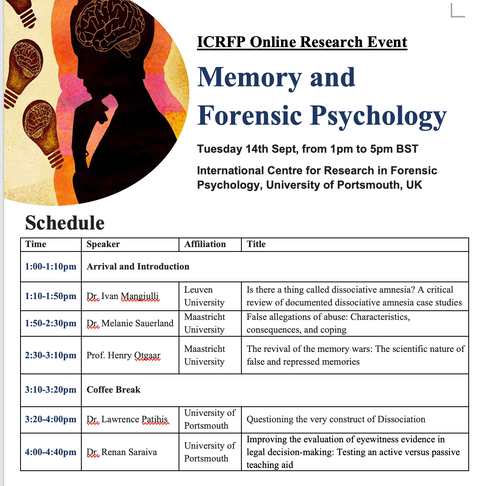International Centre for Research in Forensic Psychology
Memory and Psychology Event - September 2021
Schedule & Recorded Sessions [Part 1 and Part 2]
Spreakers and Absracts
Is there a thing called dissociative amnesia? A critical review of documented dissociative amnesia case studies
Speaker: Dr. Ivan Mangiulli
Abstract: Dissociative amnesia is one of the most controversial phenomenon in psychology and psychiatry. In a nutshell, dissociative amnesia is described as an inability to remember important autobiographical experiences, usually of traumatic and/or stressful nature. For one thing, dissociative amnesia runs counter evidence that traumatic experiences are well-remembered and difficult to be forgotten. In this talk I will (1) briefly illustrate the controversial aspects of dissociative amnesia, and (2) highlight how majority, if not all, of the dissociative amnesia case studies reported in the literature (2000-2020) are incomplete and weak with respect to nature, differential diagnoses, and alternative explanations of alleged memory loss.
False allegations of abuse: characteristics, consequences, and coping
Speaker: Dr. Melanie Sauerland
Abstract: Our knowledge about the characteristics and consequences of and coping with allegedly false accusations of abuse is scarce. Only two UK surveys have looked at such accusations in the family context previously. To help fill this gap, we set out a survey amongst members of a German support organization for victims of false abuse accusations. Sixty-one respondents provided information about themselves, the accuser, the accusation, consequences of the allegation, and their coping behavior. Our findings replicate earlier findings about the characteristics of the accused, accuser, and the accusation and provide novel information about the consequences for the accused and their coping behavior. The current findings also echo previous findings regarding the role of therapy in the development of such accusations.
The revival of the memory wars: The scientific nature of false and repressed memories
Speaker: Prof. Henry Otgaar
Abstract: Currently, a heated debate is ongoing on whether traumatic memories can be unconsciously repressed. Although scientific research speaks against the idea of repressed memory, in this presentation, I will show that this idea is endemic within clinical, academic, and legal settings. I will show that the belief in repressed memory can be dangerous in clinical and legal settings as clinicians might suggestively search for hidden memories of abuse. Such suggestion can foment false memories leading to false accusations and even wrongful convictions. I will present some good news showing that the belief in repressed memory can be debunked.
Questioning the very construct of Dissociation
Speaker: Dr. Lawrence Patihis
Abstract: Dissociation as an idea and construct was introduced to society by physician hypnotists in the Paris School of hypnosis in the 1880s and 1890s. In the 1980s a purportedly scientific measure of the construct was developed: the Dissociative Experiences Scale. It consists of three subscales" dissociative amnesia, depersonalization, and absorption. It has been reported to have good reliability and validity. But does it? In this talk I contemplate both the logic, rationalism, and the data, empiricism, connected to this dissociation scale.
Improving the evaluation of eyewitness evidence in legal decision-making: Testing an active versus passive teaching aid
Speaker: Dr. Renan Saraiva
Abstract: Judges, jurors and other triers of fact often rely upon eyewitness evidence in criminal trials, but eyewitness memory is not always accurate and can sometimes be contaminated. The I-I-Eye is an evidence-based teaching aid designed to improve the evaluation of eyewitness evidence in legal settings. We tested the I-I-Eye and examined whether adding an active component to this teaching aid improves its effectiveness. Results of two experiments showed that the I-I-Eye improved participants' sensitivity to eyewitness evidence, although the active component did not improve sensitivity. We found initial evidence that the I-I-Eye is effective in a short video format and may assist decision-makers in the evaluation of eyewitness evidence.
